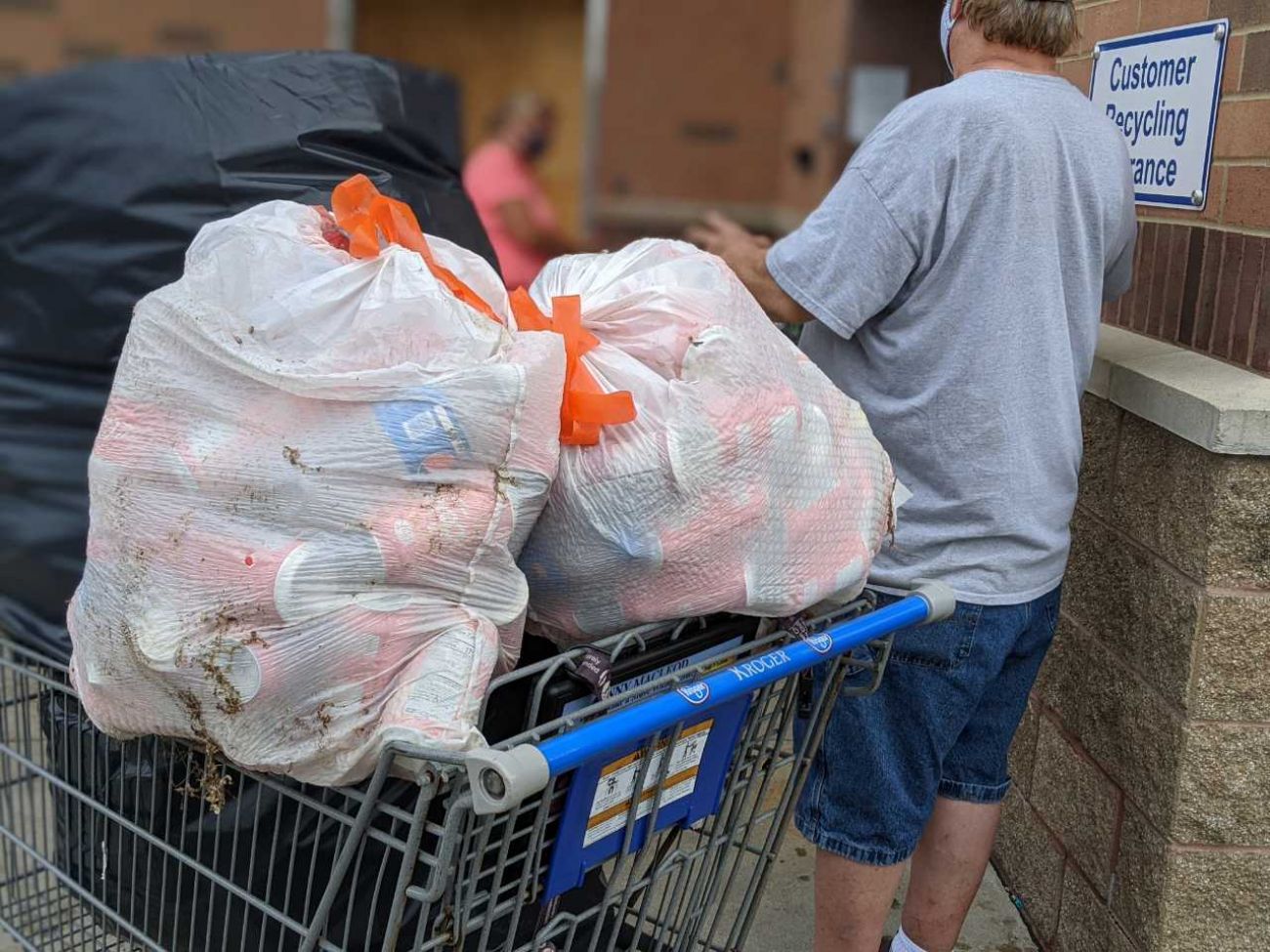Michigan may get through COVID-induced bottle backlog sooner than expected

Timing is everything in the quest to liquidate piles of redeemable bottles and cans that still languish in garages, basements and underneath kitchen sinks nearly three months after Michigan lifted a COVID-19 moratorium on beverage recycling.
Kilgore Terrell had the recycling machines to himself Thursday evening at the West Saginaw Avenue Meijer in Lansing, and made quick work of two carts full of redeemables he had amassed during the 11-week shutdown that ended June 15.
But that was only after long lines during a recent weekend forced Terrell to abort a previous recycling mission.
Related stories:
- Michiganders passed up $108 million in bottle deposits amid COVID closures
- Beverage companies want cut of Michigan bottle bill windfall during COVID
- Michigan businesses want cut of millions from uncollected pop returnables
- Michigan was once a recycling leader. Today, it’s in the pits.
“Everyone was returning their bottles, all at the same time,” he said. “I don’t really like big crowds of people right now, so I left.”
The Michigan Department of Environment, Great Lakes and Energy estimates that Michiganders stockpiled 800 million recyclable containers while returns were banned. The policy was enacted to keep COVID-19 from spreading and help free grocery workers for other tasks during the pandemic as panicked customers cleared shelves of toilet paper, beans and bread.
Since reopening, many retailers continue to reduce their bottle room hours, restrict the volume of cans each customer can return, and sometimes close redemption centers abruptly due to overloaded systems as Michigan’s recycling infrastructure struggles to absorb pent-up demand following the shutdown.
“Everyone is overtaxed right now,” said Amy Drumm, vice president of government affairs for the Michigan Retailers Association. She said the dramatic increase in return volumes coincides with ramped-up cleaning regimens and other COVID-19 restrictions that can pose a particular challenge in redemption rooms full of sticky, dirty beverage containers.
The good news is: The madness may be nearing its end. Representatives from Michigan’s soft drink and recycling industries told Bridge Michigan they are outpacing original projections of how long it would take to liquidate the stockpile of bottles and cans.
After the state ordered retailers with vending machine-based redemption centers located at the front of the store or in a separate area to resume accepting returnable containers, industry officials originally projected it would take six months— roughly until near the end of the year— to get recycling rooms back to normal capacity.
Redemption facilities remain closed at stores without dedicated space for recycling machines and those where employees count cans by hand. Ron Leix, a spokesman for the Michigan Department of Treasury, said officials have no timeline for reopening recycling at those facilities.
Worries about an overburdened system prompted the Michigan Department of Environment, Great Lakes and Energy to issue a July notice encouraging “continued patience” from consumers as retailers, distributors and recyclers work through “an unprecedented volume of containers.”
But recycling may be one area in which predictions of prolonged COVID-19 disruption were overblown.
“We have gotten through the vast majority of the backlog,” said Nick Kronsbein, vice president and general manager of UBCR, a logistics company that contracts with beverage distributors to pick up bottles and cans from stores across the state, process them, and pass them on to recyclers.
Kronsbien said most Michigan recyclers should notice a return to normalcy sometime this fall, though the timeline could vary by region.
Kronsbien said UBCR, which processes more than half of all beverage containers recycled in Michigan, has collected and processed about 85 percent of its “normal” volume for this time of year. Immediately following the 11-week shutdown, UBCR was at just half of normal, he said.
Kronsbien attributed the earlier-than-expected progress to extraordinary effort from the industry. UBCR, for instance, hired additional drivers and ran trucks 24/7, virtually doubling efforts to pick up empty bottles and cans from grocery stores to make room for additional customer returns.
Now, with most Michiganders apparently finished working their way through the stockpiles, Kronsbien said, UBCR is down to about 130 percent of normal.
But for at least a few weeks longer, consumers can expect to continue seeing reduced hours, quantity limits, and, at times, long lines or even abrupt closures at busy bottle rooms.
“You’ve got a couple of unknowns still out there,” said Derek Bajema, president and CEO of the Michigan Soft Drink Association, including charitable organizations that staged bottle and can drives during the shutdown and are now “sitting on a lot of containers” that still need to be recycled.
How fast Michigan absorbs the remaining stockpile will depend in part in how zealous Michiganders are about redeeming their dimes. People in communities with municipal recycling service have the option of simply dropping empty cans at the curb to avoid waiting in line at the recycling machines—a move the Michigan Retailers Association has encouraged.
“We're seeing more people willing to just kind of move on, who are not interested in collecting a dime because it's just not worth their time,” Drumm said.
Money from those unredeemed dimes also goes into the pockets of retailers, who receive 25 percent of total revenue from unclaimed deposits. The other 75 percent goes to the state Cleanup and Redevelopment Trust Fund, where much of it supports EGLE’s efforts to clean up and redevelop contaminated sites.
So far, it seems many people are willing to endure the headache for their dimes. In the first two weeks after recycling reopened, EGLE spokeswoman Jill Greenberg said, 150 million containers were returned.
“It really shows people were ready to get those bottles and cans out of their garage,” Greenberg said.
The backlog is feeding into a pre-existing debate over Michigan’s recycling system. Industry groups, many of whom have advocated in the past for changes to Michigan’s bottle law, are pushing a series of bills that would redistribute some recycling revenue into distributors’ coffers and increase penalties for redemption fraud.
They argue the revenue would help them invest in infrastructure needed to keep the redemption system running smoothly. The logistical challenges at redemption centers following the bottle return shutdown underscore the need, they argue.
The legislation’s opponents, meanwhile, argue the money does more good in public hands.
Revenue from unredeemed bottles amounted to $43 million in 2018. The state could see an increase in that figure this year if a significant number of Michiganders turn to curbside recycling to avoid the headache of grocery store returns.
Residents still waiting to clear their pop can pileup should rinse and store clean containers in a dry location, Greenberg said. And Bajema said those who don’t want to wait to offload their containers should take a cue from Kilgore Terrell: Consider visiting the grocery store on weekdays and evenings to avoid crowds and clogged machines at the redemption room.
Michigan Environment Watch
Michigan Environment Watch examines how public policy, industry, and other factors interact with the state’s trove of natural resources.
- See full coverage
- Subscribe
- Share tips and questions with Bridge environment reporter Kelly House
Michigan Environment Watch is made possible by generous financial support from:
Our generous Environment Watch underwriters encourage Bridge Michigan readers to also support civic journalism by becoming Bridge members. Please consider joining today.
See what new members are saying about why they donated to Bridge Michigan:
- “In order for this information to be accurate and unbiased it must be underwritten by its readers, not by special interests.” - Larry S.
- “Not many other media sources report on the topics Bridge does.” - Susan B.
- “Your journalism is outstanding and rare these days.” - Mark S.
If you want to ensure the future of nonpartisan, nonprofit Michigan journalism, please become a member today. You, too, will be asked why you donated and maybe we'll feature your quote next time!






